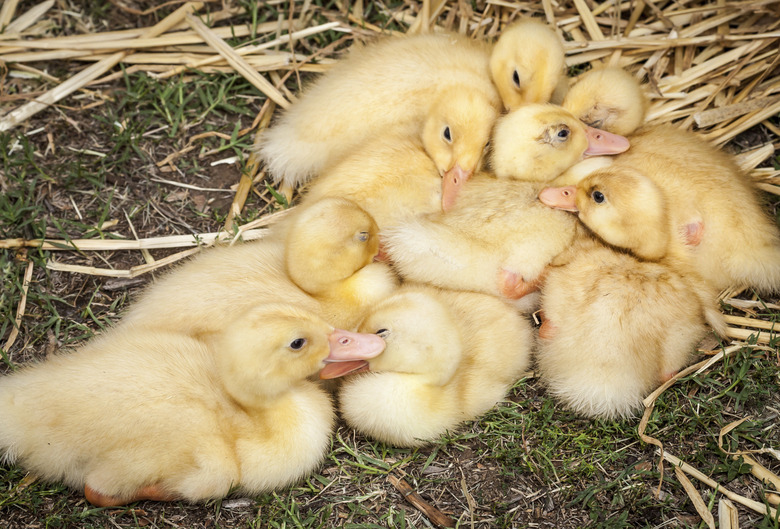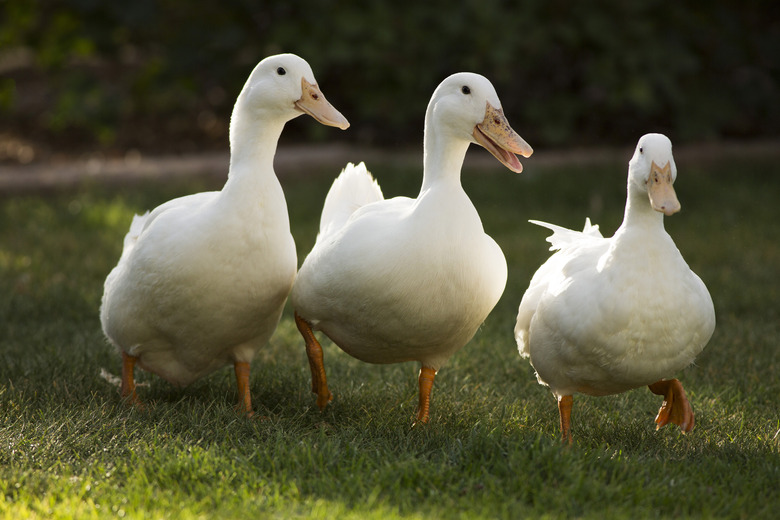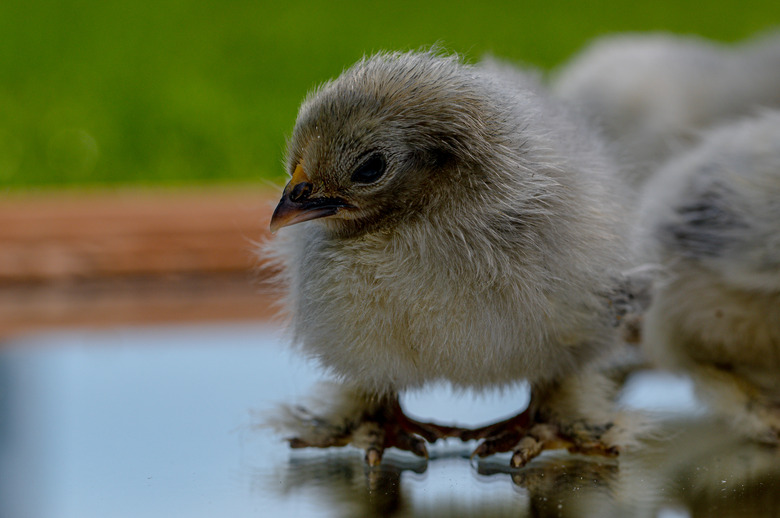How To Take Care Of Domesticated Pekin Ducks
Caring for a Pekin duck pet is basically the same as caring for other duck species: You must provide them with suitable accommodations, a good diet, and plenty of drinking water. Additionally, as most people acquire Pekin ducks as hatchlings, it is important to provide the ducklings with suitable warmth until they are old enough to regulate their own temperatures. Pekin ducks are a white duck species and can be rewarding pets, but they require a significant amount of care when young, and they need ample space once they mature.
Brooder boxes for baby Pekin ducks
Brooder boxes for baby Pekin ducks
Be prepared for your new Pekin ducks before you acquire them. Make a brooder box by suspending a heat lamp over one end of a large plastic storage box. Place a thermometer under the heat lamp so that you can monitor the temperatures. Use straw or newspaper on the bottom of the box as bedding.
Add a small dish of duck food, a small dish of grit, and a small water dish to the bottom of the brooder box. As soon as you get your Pekin hatchlings, offer them water to prevent dehydration, then place them in the brooder box so they can rest.
Ducking cold temperatures
Ducking cold temperatures
The optimum temperature for baby Pekin ducks drops as they grow and mature. Keep ducklings less than 1 week old at 86 degrees Fahrenheit and decrease the temperature by about 5 degrees each week. During their second week of life, keep your ducklings at about 81 degrees. Aim for 73 degrees during their third week.
By the time they are 4 weeks old, the ducklings can safely handle temperatures of about 66 degrees Fahrenheit. The following week, you should lower the temperature to 59 degrees — after this point, the ducks' ideal temperature is 55 degrees.
Adult Pekin duck accommodations
Adult Pekin duck accommodations
Once your ducks are about 2 months old, you'll begin caring for them as adults. From this point forward, provide them with a spacious outdoor enclosure. Pekin ducks do not fly, so their pen does not need a top to keep them inside—but a top will help to keep predators away from your ducks.
The minimum necessary floor space for Pekin duck maintenance is about 3 square feet per adult, but this requirement is for commercial duck rearing. Pet ducks will benefit from as much space as you can give them. A 10-foot-square space should be the minimum for one or two pet ducks.
Access to water
Access to water
Try to provide a large pool or pond for adult Pekin ducks. While ducks do not require a pool to survive, swimming opportunities confer many benefits on them. If you cannot provide a pool for your ducks, you must ensure that they always have access to clean, fresh drinking water. Ducks make a mess of their water quickly, so you must filter or frequently change every water source in their enclosure.
If a permanent pool is not feasible, consider giving your ducks access to a small plastic pool for a few hours, once or twice per week. Because their oil glands are not fully developed, ducks under 2 months of age should not have access to a pool or pond. Allow young ducks to swim only when you can observe them, and be sure they have access to their brooder lamp afterward.
Dietary requirements for ducks
Dietary requirements for ducks
If possible, feed your Pekin ducks food specifically formulated for hatchling ducks. If you cannot find duck food, provide chicken starter mash — but it is important that you do not give them medicated chicken starter, as it will make your ducks sick. Once your ducks reach 10 weeks of age, you can transition them to "grower" duck feeds. At 18 weeks of age, they are ready for "breeder" formulations. Always be sure that water is present when your ducks are eating.
Hand washing and hygiene
Hand washing and hygiene
Ducks can carry many zoonotic diseases, such as salmonella. Accordingly, it is important to practice strict hygiene and avoid allowing children under 5 years of age to handle ducks or play in their enclosures. Never keep ducks in kitchens or in bathrooms used by people, and never clean their cage items in these areas. Always be sure to wash your hands with soap and water after handling ducks or any of their accessories.


